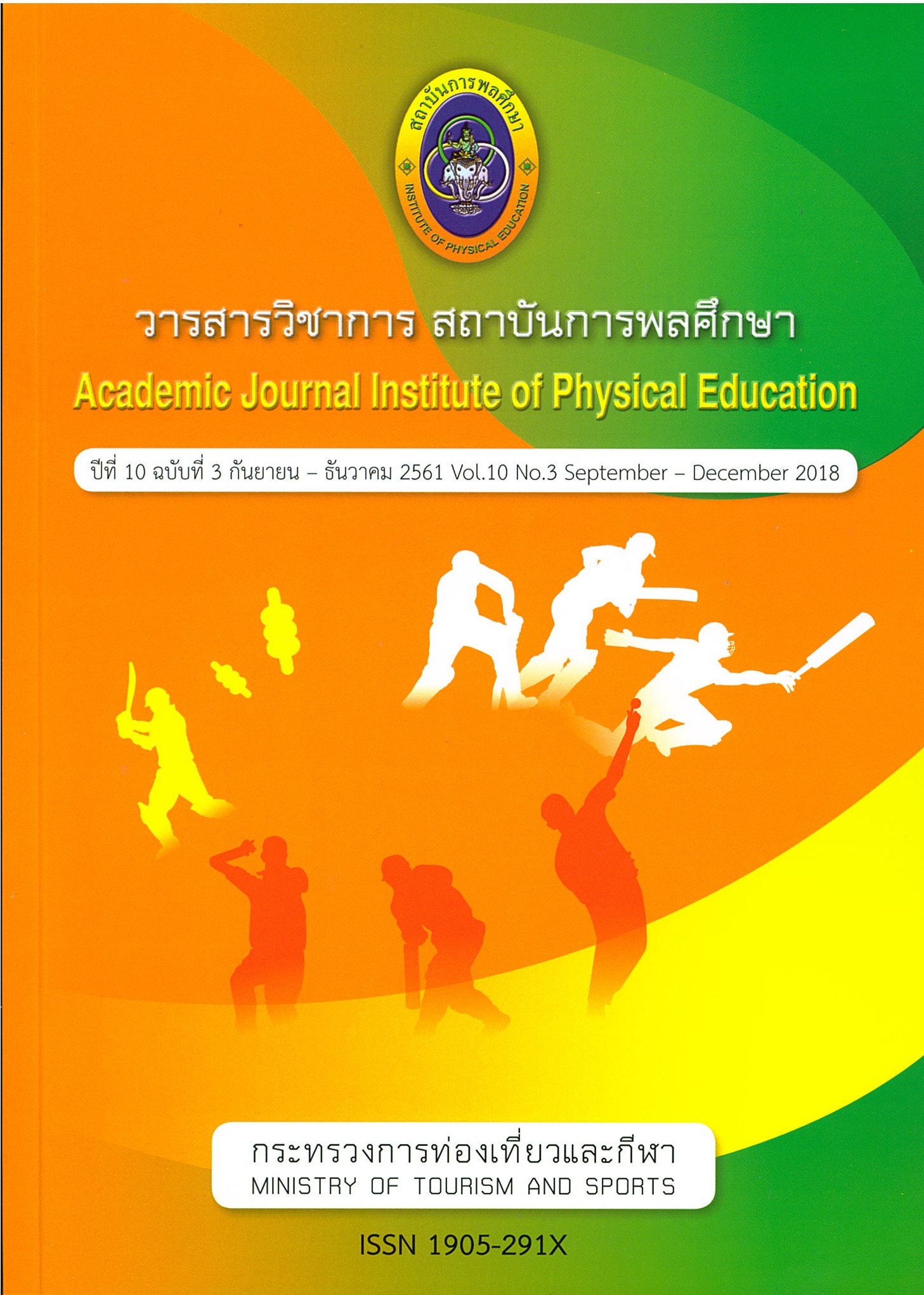Factors Affecting on Quality of Work life of Instructors Faculty of Education, Institutes of Physical Education
Main Article Content
Abstract
Purpose to Study Factors Affecting on Quality of Work life of Instructors Faculty of Education, Institutes of Physical Education. The Subjects of 150 were Stratified Random Sampling from lecturer of Faculty of Education, Institutes of Physical Education in Academic Years 2016. The Data were then Analyzed interms of Mean, Standard Deviationand Stepwise Multiple Regression Analysis.
1. The Study of Factors Affecting on Quality of Work life of Instructors Faculty of Education, Physical Education Institutes: Pride in the organization, Work attitude, Trust and accept goalsand values and Motivation to work found that Asa whole, were at a high level.
2. Quality of Work life of Instructors Faculty of Education, Institutes of Physical Education was at a high level.
3. The factors which could Quality of Work life of Instructors Faculty of Education, Institutes of Physical Education comprised these 2 variables: Motivation to work and Pride in the organization. These 2 factors could predict a Quality of Work life of Instructors Faculty of Education, Institutes of Physical Education about percentage of 62.90 The significantly predicted equations were as follows :
In term of raw scores were : Y/ = .439 + .493 (X5) + .368 (X2)
In term of standard scores were : Z/Y = .519 (Z X5) + .315 (Z X2)
Article Details
The published article is a copyright of the Academic Journal of Thailand National Sports University. The passage appeared in each article in this academic journal is a perspective of each author which is not related to the journal. Each author is required to be responsible for all components of his/her own article. If there are any mistakes, each author must be responsible for those mistakes on his/her own.
References
กมล กฤษวงศ์และณกมล จันทร์สม. (2556). ปัจจัยที่ส่งผลต่อคุณภาพชีวิตการทำงานของข้าราชการกองอำนวยการรักษาความมั่นคงภายในราชอาณาจักร. วารสารการวิจัยทางธุรกิจและการบริหาร. 1(1), 100-112.
ถวิลวงษ์ปินะสา. (2555). คุณภาพชีวิตในการทำงานกับความผูกพันต่อองค์กรของครูผู้สอนระดับประถมศึกษา สังกัดสำนักงานเขตพื้นที่การศึกษาประถมศึกษาปทุมธานีเขต 2. วิทยานิพนธ์ปริญญาโท ครุศาสตรมหาบัณฑิต มหาวิทยาลัยราชภัฎวไลลงกรณ์. ถ่ายเอกสาร
ภาณุภาคย์พงศ์อติชาติ. (2550).สมดุลระหว่างชีวิตกับการทำงาน (Work life Balance). ในการเสริมสร้างคุณภาพชีวิตและการทำงาน กระแสใหม่ของการบริหารทรัพยากรบุคคล.กรุงเทพฯ:สำนักงาน ก.พ.
รจนา ป้องนู, พิมพา ม่วงศิริธรรม, อนันต์ มาลารัตน์ และสุจิตรา สุคนธทรัพย์. (2559).อนาคตภาพของหลักสูตรศึกษาศาสตรบัณฑิต สาขาวิชาพลศึกษา ของสถาบันการพลศึกษาในทศวรรษหน้า (พ.ศ.2560-2569). วารสารวิชาการ สถาบันการพลศึกษา, 9(1), 155-168.
เศรษฐศาสตร์ ไชยแสง. (2553). คุณภาพชีวิตในการทำงานกับความผูกพันต่อองค์การของบุคลากรวิทยาลัยราชพฤกษ์. ศูนย์วิจัยและพัฒนา วิทยาลัยราชพฤกษ์.
สาธิตา วงค์กาไชย, ธนกร น้อยทองเล็ก และณัฐชา เพชรดากูล. (2556). แรงจูงใจความพึงพอใจและคุณภาพชีวิตในการทางานที่มีอิทธิพลต่อพฤติกรรมการเป็นสมาชิกที่ดีของพนักงานส่วนตำบล ํ จังหวัดลำปาง. ํ วารสารการจัดการ คณะวิทยาการ มหาวิทยาลัยราชภัฎลำปาง, 6(2), 107-118.
สีมา สีมานันท์. (2550). หลักสูตรเฉพาะทางสำหรับรองรับการทำงานตามระบบจำแนกตำแหน่งและ ค่าตอบแทนใหม่. เอกสารประกอบการการฝึกอบรม สำหรับผู้บริหารที่รับผิดชอบด้านการบริหารทรัพยากรบุคคล สำนักงาน ก.พ. กรุงเทพฯ: สำนักงานก.พ.
สุรชัย แกวพิกุล (2552). คุณภาพชีวิตในการทํางานของบุลากรวิทยาลัยพยาบาลตํารวจ. วิทยานิพนธ์สังคมสงเคราะห์ศาสตรมหาบัณฑิต, มหาวิทยาลัยธรรมศาสตร์, คณะสังคมสงเคราะห์ศาสตร์, สาขาการบริการและนโยบายสวัสดิการสังคม.ถ่ายเอกสาร
Greenberg, J., and Baron, R.B. (2000). Behavior in organizations. 7th ed. Englewood Cliffs, NJ: Prentice-Hall.
George, J.M. and Jones, G.R. (1997). Organization spontaneity in context Human performance. 10, 153-170.
Hair, Jr., J. F., Black, W. C., Babin, B. J., Anderson, R. E., & Tatham, R. L. (2006). Multivariate Data Analysis. (6th Ed.). Upper Saddle River, NJ: Pearson Prentice Hall.
McClelland, D.C. (1985). Human Motivation. Oakland, N.J. : Scott. Foresman & company.
Michael, L., Sue, M. and Dave, U. (2005) The Future of Human Resource Management: 64 Thought Leaders Explore the Critical HR Issues of Today and tomorrow. Newjersey: John Wiley.
Moorman, R. H., and Blakely, G.L.(1995). Individualism collectivism as an individual difference predictor of organizational citizenship behavior. Journal of Organizational Behavior. 16(2), 127-142.
Schumacker, R. & Lomax, R. (2010). A Beginner’s Guide to Structural Equation Modeling. 3rd ed. New York: Routledge


